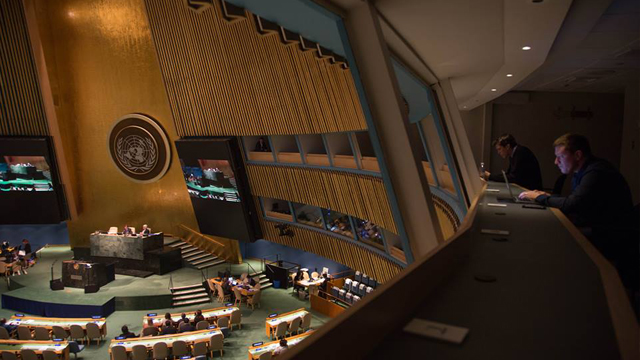The UN General Assembly Special Session on Drugs (UNGASS) adopted the outcome document without a debate, right before the real discussion could have started.
This year, for the first time since 1998, the highest decision-making forum of the UN, the General Assembly, put drugs on its agenda. Although the Secretary General had called for “a wide-ranging open debate that considers all options”, this has clearly not happened. The UNGASS adopted the outcome document at the opening session, without a debate.
The outcome document was finalised by the Commission on Narcotic Drugs in Vienna last month (read & watch our report!). It consists of watered-down text which can be interpreted in many ways, and lacks clear guidance on key issues such as harm reduction, the death penalty, the criminalisation of drug users, and the regulation of drug markets.
Critics have pointed out that not all governments have permanent representation in Vienna, which means that many, especially those from Africa, were effectively excluded from the discussions. This may be true, but I don’t think the participation of African countries would have significantly changed the document. What is really apalling, however, is that the UNGASS failed to achieve its goal – to conduct a meaningful debate on current drug policies and their alternatives – because the governments approved the document even before the real debate could have started!
The UNGASS lasts for three days, and includes five thematic workshops (health, crime, new challenges, human rights, alternative development). The outcome document was supposed to highlight the conclusions from these thematic discussions. As it is, the debate at the UNGASS is a mere formality, with no practical outcome. In addition, the outcome document is very long and vague, and includes no action plan with clear goals – thus, nobody knows what the next steps should be, until governments gather again in 2019 to discuss the issue again.
When, at his press conference, I asked Mr. Yuri Fedotov, director of the UNODC, whether it was logical to reach conclusions before starting the debate, he said it was an issue of scheduling: It was better to have workshops to discuss issues without constraints, rather than having a long discussion on how to frame the text of the document itself. Well, no doubt it is tough to adopt a document, and it takes time, but still – does it make sense to draw conclusions before the debate?
At least some governments have shown some common sense – governments such as Canada, which announced at the UNGASS today that they will make cannabis legal, in order to keep it away from children and take it out of the hands of criminals – and also open supervised injection sites, to save lives. In his speech (read it here!) Svatopluk Nemecek, the minister of health of the Czech Republic pointed out that “the international drug policy as we have known it has failed dramatically. Intended to protect people, but based on prohibition and criminalisation, our efforts have had detrimental effects on public health and public security.” Perhaps the UN is staying the same, but the world is moving on. And that is what makes the UNGASS itself frustratingly irrelevant.
Peter Sarosi and Istvan Gabor Takacs from the UN Headquarters, New York




